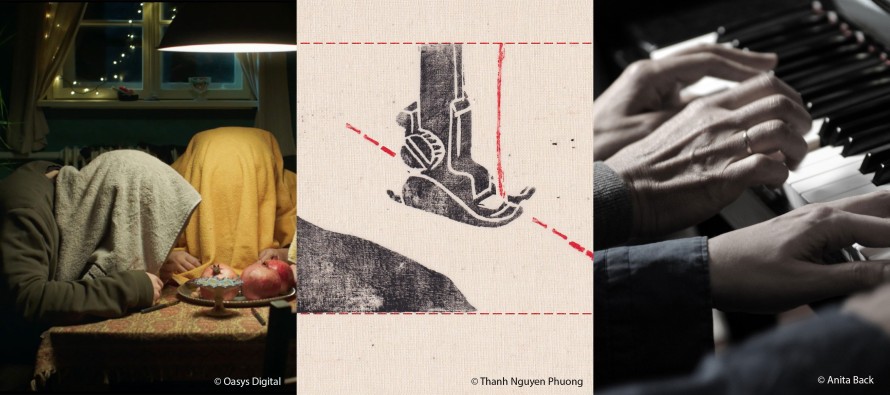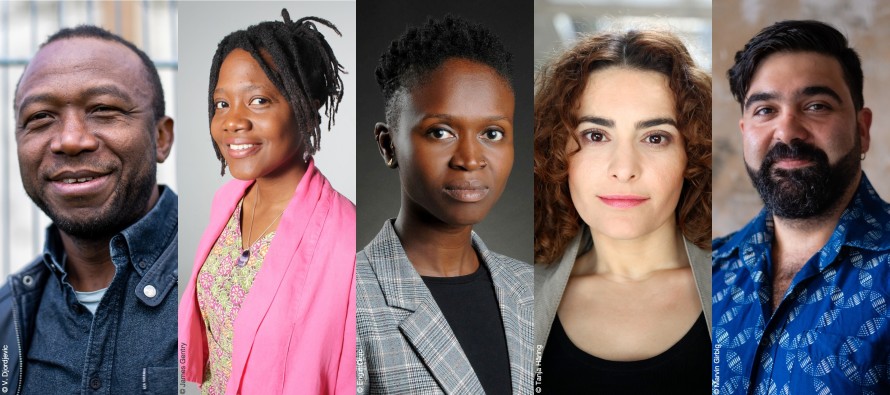Forum & Forum Expanded
May 17, 2021
Forum Special Programme: “Fiktionsbescheinigung. 16 Cinematic Perspectives on Germany”

From left so right: In the Name of Scheherazade oder der erste Biergarten in Teheran (In the Name of Scheherazade or the First Beer Garden in Tehran), Sorge 87, Auf den zweiten Blick (At Second Glance)
The connections between culture in general, cinema in particular, society and racism are currently the subject of controversial discussion. The Berlinale Forum steps into the debate by presenting the film and discussion series “Fiktionsbescheinigung. 16 Cinematic Perspectives on Germany” an experiment in shared curatorial responsibility that puts a spotlight on a chapter of German film production that has been unfairly neglected.
The Berlinale Forum harbours a keen interest in the areas of film history yet to be properly illuminated and is always looking for new ways to think about the relationship between cinema and society. Both interests come together in this year’s special programme “Fiktionsbescheinigung. 16 Cinematic Perspectives on Germany”. The film and discussion series being put on in collaboration with SİNEMA TRANSTOPIA is dedicated to the work of Black directors and directors of color in Germany.
The films were selected by the curators Enoka Ayemba, Karina Griffith, Jacqueline Nsiah, Biene Pilavci and Can Sungu. Eight programmes consisting of features and shorts bring together works from across four decades, including Tour Abroad by Ayşe Polat (1999), Gölge by Sofoklis Adamidis and Sema Poyraz (1980) and In the Name of Scheherazade or the First Beer Garden in Tehran by Narges Kalhor (2019). Some of the films pick up on the experience of migration, addressing it directly or in more mediated fashion, just as others allow themselves the freedom of no longer taking it seriously. While Mala Reinhardt’s The Second Attack (2018) grapples with the structural racism of the majority society in unflinching fashion and indicts the failure of the authorities in the case of NSU terrorism, Visar Morina’s Exile (2020) is primarily interested in the subcutaneous effects that the experience of racism has on an individual. Sheri Hagen’s At Second Glance (2012) makes specific Black experiences visible but not in such a way that they determine an individual.
The five curators explain their selection in a statement: “The series sees itself as a snapshot of an ongoing, self-determined process of intervention and protest. Each of the films functions as a suggestion as to how the white German gaze can be countered with diverse, intersectional perspectives, with all of them having one thing in common: their own visual and textual practice of testimony from within, not from the margins.”
The films can first be seen from June 9 to 30 on the streaming platform of Arsenal – Institute for Film and Video Art (https://www.arsenal-3-berlin.de/en/). The discussion programme, which includes talks with the filmmakers, experimental, interactive formats, panels with scholars, festival programmers, actors and the curators, a keynote speech by scholar Kevin B. Lee and a lecture by filmmaker Biene Pilavci, will be taking place online. The film programme will be shown in August at SİNEMA TRANSTOPIA’s (https://bi-bak.de/en/bi-bakino) outdoor space.
Curators and Programme of: “Fiktionsbescheinigung. 16 Cinematic Perspectives on Germany”

From left to right: Enoka Ayemba, Karina Griffith, Jacqueline Nsiah, Biene Pilavci, Can Sungu
Enoka Ayemba is a film curator and film critic focusing on African cinematographies, the Nigerian video industry and anti-colonial movements. He has been a consultant for the Berlinale Forum since 2019.
Karina Griffith’s work has been shown at international galleries, theatres and festivals. She has curated film and interdisciplinary programmes for the Goethe-Institut and Ballhaus Naunynstraße among others. She teaches at the Berlin University of Art Institute for Art in Context and is a PhD candidate at the University of Toronto where her research on Black authorship in German cinema interacts with theories of affect and intersectionality.
Jacqueline Nsiah is a freelance film festival, arts and cultural consultant. Her years of experience across the world include her work as co-director of the Cambridge African Film Festival in 2008 and as producer of the Real Life Documentary Film Festival in Accra. Nsiah currently works as a curator for the Berlinale Forum and as a project manager for the Goethe-Institut’s African industry film platform cinidb.africa.
Biene Pilavci began the directing programme at the DFFB in Berlin in 2005 where she made numerous short films. Pilavci completed her studies in 2012 with her third-year film Alleine tanzen about the power of family. In 2013, she made Chronik einer Revolte – Ein Jahr Istanbul together with Ayla Gottschlich with support from ZDF and ARTE. She is co-founder of the film-political initiative NichtmeinTatort and the film network Neue Deutsche Filmemacher*innen.
Can Sungu is a freelance artist, curator and researcher. He has given lectures on film and video production and curated several programmes on film and migration. He has also taken part in various exhibitions, including at Künstlerhaus Wien and REDCAT Los Angeles. In 2014, he co-founded bi'bak in Berlin, where he works as artistic director. Since 2020, he has been running the cinema experiment SİNEMA TRANSTOPIA at the Haus der Statistik in Berlin.
Programme 1
Die Türhüter
Federal Republic of Germany 1988, 17'
by Sema Poyraz
with Semra Uysal
In 1988, it’s not only the physical wall dividing the city that the Turkish inhabitants of Kreuzberg must contend with. Their experiences of social limits are interwoven with Kafka’s “Before the Law”: an immigrant perspective on West Berlin.
Bruderland ist abgebrannt (Brotherland Is Burned Out)
Germany 1992, 28'
by Angelika Nguyen
with Pham Quoc Bao, Le Duy Trung and many more
Tens of thousands of Vietnamese contract workers employed in East Germany lost their jobs due to reunification. Angelika Nguyen’s important document was made shortly afterwards and asks what became of the promised solidarity and fraternity.
Sorge 87
Germany 2018, 10'
by Thanh Nguyen Phuong
with Wolfgang Neubert, Gisela Neubert, Hoan Nguyen Duc
Vietnamese contract workers were hired in Werdau in Saxony in the 1980s to staff the textile factory, bringing life to the small town. Thanh Nguyen Phuong animates fabric prints to bring back the memories of that time.
Programme 2
Octavia’s Visions**
Germany 2021, 18'
by Zara Zandieh
with Sandra Bello, Mandhla Ndubiwa, Nancy Andler
The challenges of the 2020s from the perspective of 2056: environmental destruction, nationalism and the after-effects of colonial racism. Zandieh draws on Black science fiction author Octavia Butler’s work to ask how such problems can be overcome.
In the Name of Scheherazade oder der erste Biergarten in Teheran (In the Name of Scheherazade or the First Beer Garden in Tehran)
Germany 2019, 76'
by Narges Kalhor
with Ali Abusaiedi, Tahmineh Dokhani, Faezeh Nikoozad
Kalhor links her own biography to the figure of Scheherazade, Bavarian traditions to contemporary Iran and documentary elements to layers of fiction in unbridled fashion. A humorous play of different forms about cultural ignorance and narration itself.
Programme 3
Exil** (Exile)
Germany / Belgium / Kosovo 2020, 121'
by Visar Morina
with Mišel Matičević, Sandra Hüller, Rainer Bock
Pharmaceutical engineer Xhafer is being harassed at work, as his relationship to his wife also crumbles. High summer in an unnamed German city. Emotions come to the boil and the same question keeps popping up: racism or paranoia?
Programme 4
Der zweite Anschlag (The Second Attack)
Germany 2018, 62'
by Mala Reinhardt
with Mai Phuong Kollath, Ibrahim Arslan, Osman Taşköprü
Germany is dotted with places where racially motivated murders took place. After such killings, a society which denies structural problems and covers for perpetrators is like a second attack. Reinhardt’s film sticks to the point of view of the victims.
Programme 5
Gölge
Federal Republic of Germany 1980, 92'
by Sofoklis Adamidis, Sema Poyraz
with Semra Uysal, Yüksel Topçugürler, Birgül Topçugürler
18-year-old Gölge daydreams her way out of her cramped family life in Berlin-Kreuzberg. She wants to become an actress, have relationships without imbalance and try things out. A coming-of-age story in the Turkish immigrant community.
Programme 6
Riss (The Tear)
Germany 2010, 9'
by Biene Pilavci
with Klaas Heufer-Umlauf, Aylin Tezel, Friedhelm Ptok
A couple on their way home get into an argument with a driver who tries to provoke them. They lose their cool and a rift opens up between them for a short while. Can they reconnect?
Auf den zweiten Blick (At Second Glance)
Germany 2012, 95'
by Sheri Hagen
with Anita Olatunji, Michael Klammer, Ella-Sade Hagen-Janson
Six lonely people find each other in a wintry Berlin: a widower and a blind jazz musician, a piano tuner and an art dealer struggling with his sexuality, a patient and his therapist who’s going blind.
Programme 7
Fake Soldiers
Germany 1999, 24'
by Idrissou Mora-Kpai
with Francis Codjoe, Mizrajim Komi Togbonou, Dean Burke
Basketball, hip-hop and breakdancing are in fashion in Germany at the end of the 1990s, as are African-Americans too by extension. Tamu and Obi hardly possess the same cool, however – they are only a hit with the women when they pretend to be US soldiers.
Auslandstournee (Tour Abroad)
Germany 1999, 91'
by Ayşe Polat
with Hilmi Sözer, Özlem Blume, Martin Glade
When an old friend of Zeki’s dies, the singer is given the task of helping his daughter Şenay find her mother. A road trip through the Turkish nightclub scene of Europe ensues, a tender account of life dreams, family and the homes we choose.
Programme 8
18 Minuten Zivilcourage
Germany 1991, 20'
by Rahim Shirmahd
In 1987, Kiomar Javadi was accused of shoplifting at a Tübingen supermarket and ended up being strangled to death for 18 minutes by an employee. Part of the town is up in arms, while the majority simply don’t want to see the crime as racially motivated.
Black in the Western World*
Germany 1992, 23'
by Wanjiru Kinyanjui
with Natalie Asfaha, Tsitsi Dangarembga, Paul Ford
At the start of the 1990s, Kenyan DFFB student Kinyanjui grappled with how it felt to be Black in Germany. Racist material from German everyday culture rubs up against conversations with other Black people in Europe.
Jordmannen (The Earthmen)
Sweden 1980, 27'
by Muammer Özer
with Lâle Kaplanoğlu, Munibe Akdağ, Sergio Buchman
In Özer’s hybrid film, the clay figure is a symbol of the fate of migrant workers in a prosperous society. Hope of a better life gradually gives way to the realisation that exploitation and alienation determine everyday life.
ziyaret, Besuch (ziyaret, Visit)*
Germany 2019, 13'
by Aykan Safoğlu
with Gülşen Aktaş, Nurşen Aktaş
Safoğlu’s essay film uses photographs to depict a wander through a Berlin graveyard with Kurdish feminist Gülşen Aktaş and an account of the activists resting there. A cinematic monument that considers the relationship between photography and memory.
* These films are part of the curators’ selection, but can’t be shown online.
** Due to licensing reasons, these films can only be watched in Germany (Octavia’s Visions) or only in Germany and Austria (Exil).
Current information on the programme “Fiktionsbescheinigung. 16 Cinematic Perspectives on Germany” can be found at https://www.arsenal-berlin.de/en/berlinale-forum/news.html.
Press Office
May 17, 2021